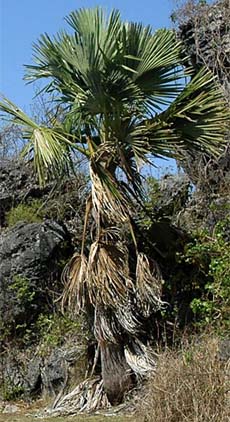Tahina spectabilis Information
Identification:
A new, previously undescribed species and genus with an affinity to the palm tribe Chuniophoeniceae, including - Nannorrhops, Kerriodoxa and Chuniophoenix. This palm most likely will not like temperatures below 19°C, coming from the small area of Analalava district in the northeast of Madagascar, where it grows in low, seasonally dry forest or scrubland. This area has eight dry months a year and a mean annual temperature of 27ºC. The palm grows in deep fertile soil at the foot of a limestone hill in ground that is seasonally flooded.
General Information:
The palm has a huge trunk which towers over 18m high and enormous fan leaves which are 5m in diameter - the most massive palm ever to be found in Madagascar. It has an unusual and spectacular lifecycle, much like Corypha and Metroxylon; growing to dizzying heights before the stem tip converts into a giant terminal inflorescence and bursts into branches of hundreds of tiny flowers. Each flower is capable of being pollinated and developing into fruit and soon drips with nectar and is surrounded by swarming insects and birds. The nutrient reserves of the palm become completely depleted as soon as it fruits and the entire tree collapses and dies due to this hapaxanthic mode of growth.
Distribution:
Native to, Madagascar
Tahina spectabilis is known only from one locality in Analalava district, in the north-west of Madagascar. In the gently rolling hills and flatlands of the region, now dominated by anthropogenic grasslands, there is a small outcrop of 'tsingy', karst Tertiary limestone, running approximately north-south and about 250 m long, carrying a semi-natural vegetation. Altitude 9 m only.
Location: Madagascar (-14.750860°N, 47.431767°E)

